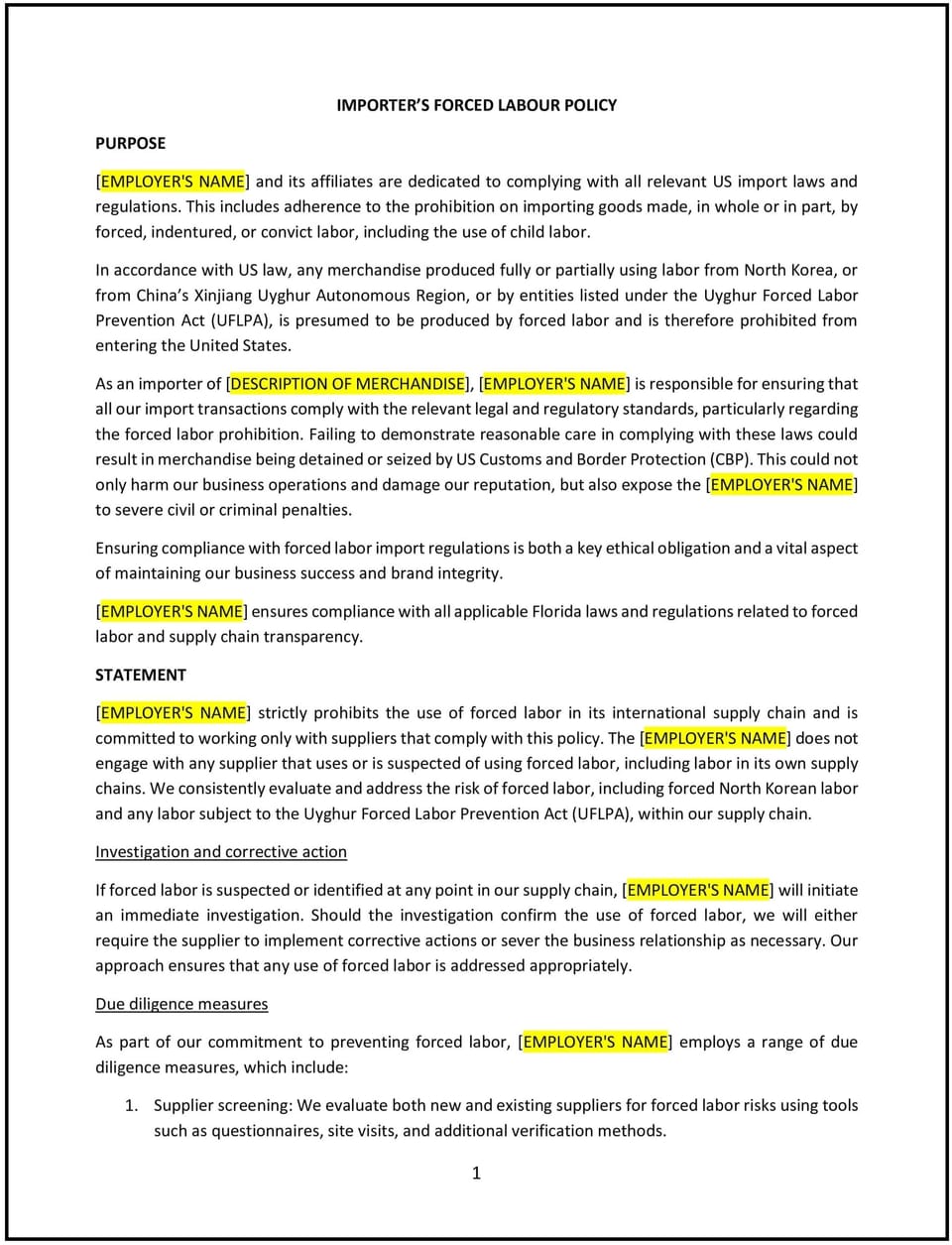Importer's forced labour policy (Florida): Free template

Importer's forced labour policy (Florida)
An importer's forced labour policy helps Florida businesses establish a framework for ensuring that their supply chains are free from forced labour practices. This policy outlines procedures for identifying risks, conducting due diligence, and addressing issues related to forced labour in imported goods. It is designed to promote ethical sourcing, reduce risks, and provide clear guidelines for maintaining responsible business practices.
By implementing this policy, businesses in Florida can demonstrate their commitment to human rights, enhance their reputation, and align with the state’s focus on ethical trade and global responsibility.
How to use this importer's forced labour policy (Florida)
- Define forced labour: Clearly specify what constitutes forced labour, including examples such as involuntary work, debt bondage, or coercion.
- Establish risk assessment procedures: Outline how businesses should evaluate suppliers and supply chains for potential forced labour risks.
- Address due diligence requirements: Explain how to conduct audits, verify certifications, and assess supplier compliance with ethical standards.
- Provide training: Educate employees on recognizing red flags, understanding forced labour laws, and following compliance procedures.
- Develop corrective actions: Specify steps to take if forced labour is identified, such as terminating contracts, reporting violations, or supporting remediation efforts.
- Communicate the policy: Share the policy with employees, suppliers, and stakeholders through handbooks, emails, or training sessions to ensure awareness and understanding.
- Monitor adherence: Regularly review supply chain practices and address any concerns or discrepancies promptly.
- Update the policy: Periodically assess the policy to reflect changes in laws, regulations, or business operations.
Benefits of using this importer's forced labour policy (Florida)
This policy offers several advantages for Florida businesses:
- Promotes ethical sourcing: Clear guidelines help prevent forced labour and foster responsible supply chain practices.
- Reduces risks: Defined procedures minimize the likelihood of legal issues, penalties, or reputational damage.
- Builds trust: Demonstrates the business’s commitment to human rights and ethical trade.
- Aligns with legal standards: Reflects Florida’s role in supporting businesses that operate within national and international legal frameworks.
- Enhances reputation: A robust policy showcases the business’s dedication to transparency and accountability.
- Improves decision-making: Helps businesses anticipate potential risks and incorporate ethical considerations into operational processes.
- Supports growth: Facilitates participation in global markets by providing a clear framework for navigating forced labour requirements.
Tips for using this importer's forced labour policy (Florida)
- Communicate clearly: Ensure employees and suppliers understand the policy by providing written materials and discussing it during meetings or training sessions.
- Train employees: Educate staff on recognizing red flags, understanding forced labour laws, and following compliance procedures.
- Use technology: Leverage tools like compliance software to track supplier audits, manage certifications, and monitor regulatory updates.
- Stay informed: Keep up with changes in forced labour laws, international agreements, or geopolitical developments that may affect supply chains.
- Conduct audits: Regularly review supplier practices and records to identify areas for improvement and ensure consistency.
- Encourage reporting: Create a process for employees or suppliers to report suspected violations or seek guidance on complex situations.
- Review periodically: Assess the policy’s effectiveness and make updates as needed to reflect changes in laws, business needs, or market conditions.
Q: Why should Florida businesses adopt an importer's forced labour policy?
A: Businesses should adopt this policy to promote ethical sourcing, reduce risks, and align with legal standards governing forced labour in supply chains.
Q: What types of risks should businesses assess in their supply chains?
A: Businesses should consider risks such as involuntary work, debt bondage, child labour, or coercion in their supplier practices or countries of origin.
Q: How should businesses conduct due diligence on suppliers?
A: Businesses should vet suppliers by reviewing certifications, conducting audits, and assessing their compliance with ethical standards and forced labour laws.
Q: What should businesses do if they identify forced labour in their supply chain?
A: Businesses should investigate the issue promptly, document findings, and take corrective actions, such as terminating contracts or reporting violations to authorities.
Q: How can businesses stay updated on forced labour laws?
A: Businesses should subscribe to updates from relevant agencies, such as the Department of Labor (DOL) or Customs and Border Protection (CBP), and participate in industry training programs.
Q: Should businesses require supplier certifications or audits?
A: Businesses should request certifications or conduct audits to verify that suppliers adhere to ethical standards and are free from forced labour practices.
Q: How often should businesses review the policy?
A: Businesses should review the policy annually or whenever there are significant changes in laws, regulations, or business operations.
This article contains general legal information and does not contain legal advice. Cobrief is not a law firm or a substitute for an attorney or law firm. The law is complex and changes often. For legal advice, please ask a lawyer.


